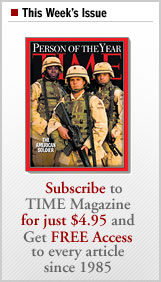 |
 |
 |
 |
 |
 |
|
|
 |
|
|
 |
 |
 |
 In Memoriam In Memoriam
TIME pays tribute to those who died in 2003
|
|
 |
|
|
|
 |
 |
 |
 |
 |
 |
 |
 |
 |
 |
|
E-mail your letter to the editor
|
|
 |
 |
 |
 |
|
|
Posted Sunday, December 21, 2003; 7:45 a.m. EST
As tag teams go, Donald Rumsfeld and his deputy, Paul Wolfowitz, could not be more unlikely. Rumsfeld is a Cook County, Ill., politician, while Wolfowitz would be more at home at the University of Chicago, where he earned his doctorate. That makes them the most interesting one-two combination this side of Bush-Cheney. If Rumsfeld is the face, mouth and strong right arm of the war in Iraq, Wolfowitz—the intellectual godfather of the war—is its heart and soul. Whereas Rumsfeld talks about Iraq like a technician, Wolfowitz sounds more like a prophet. Says a close associate of the deputy's: "Paul asks himself every day how he can limit suffering by toppling another dictator or by helping people to govern themselves."
Rumsfeld offered Wolfowitz his current post with an invitation to serve as his intellectual alter ego, a senior aide says. Their offices are a short walk apart along the Pentagon's E-Ring. Wolfowitz frequently slips down a back hallway, peers through a peephole into his boss's suite and, if Rumsfeld is alone, walks right in. "He's got great power of concentration," says Wolfowitz, "so you can open the door—it doesn't disturb him—until he pauses, and I ask, ‘Can you take a minute?'" They talk half a dozen times a day, on matters small and large. Rumsfeld likes to chaff his deputy. "If there's a grammatical error in something I've written," Wolfowitz says, "he loves to correct it and say, ‘And he has a Ph.D.!'"
Most Pentagons feature a top guy who's a big thinker and a No. 2 who's the day-to-day manager. Rummy and Wolfie (as the President calls them) have it reversed: Wolfowitz is more ideological than Rumsfeld, which has suited both men for different reasons. Wolfowitz often ventured way ahead of the rest of the Administration on foreign policy matters over the past two years, and Rumsfeld frequently let him go. That allowed Wolfowitz to push the whole Bush team to the right, which also let Rumsfeld align himself with that crowd when it served his purpose to do so. "Rumsfeld's a big-enough maestro to understand that Wolfowitz was the leading edge and that someone had to do it," a Pentagon associate says. "Are there times when it
made him uncomfortable? Absolutely. Are there times when he had to crank it back? Yes. But did it work for him? Clearly."
Wolfowitz has spent much of his career as a fierce defender of democracy. In Ronald Reagan's State Department, he pushed autocrats in Indonesia, the Philippines and South Korea toward reform. In George H.W. Bush's Administration, he was the Pentagon's No. 3 civilian and the first to argue that letting Saddam Hussein remain in power was a mistake. In the current Administration, he was the first to push Bush to topple Saddam in the wake of 9/11—and he did so just four days after the tragedy. Over coffee at Camp David, Wolfowitz privately broached the idea with Bush, who pulled him aside during a break and urged him to bring it up at a later meeting.
The onetime diplomat seems to lack the diplomatic gene. Wolfowitz was seen as clumsy and heavy-handed after the release on a U.S. government website of his memo barring nations that didn't participate in the invasion from winning U.S. contracts to rebuild Iraq—at the same time the U.S. was trying to persuade those nations to forgive Iraq's debt. Says a Pentagon official: "We ended up looking petty and petulant."
The Rummy and Wolfie show may soon go off the air. It is widely believed in national-security circles that Wolfowitz may leave the
Administration sometime in 2004. He has become too controversial for Bush to promote to Defense Secretary; Wolfowitz believed that U.S. troops in Iraq would be greeted with rose petals. He remains unbowed about the postwar effort. "I'd like to know, among those people who say we should have had better plans, just which plan they had in mind that would have prevented the murderers and torturers that raped and abused that country for 35 years from continuing to fight this destructive war until they're defeated. The bottom line is," he says, "these are tough, ugly bastards."
|
|








 Paul Wolfowitz
Paul Wolfowitz

